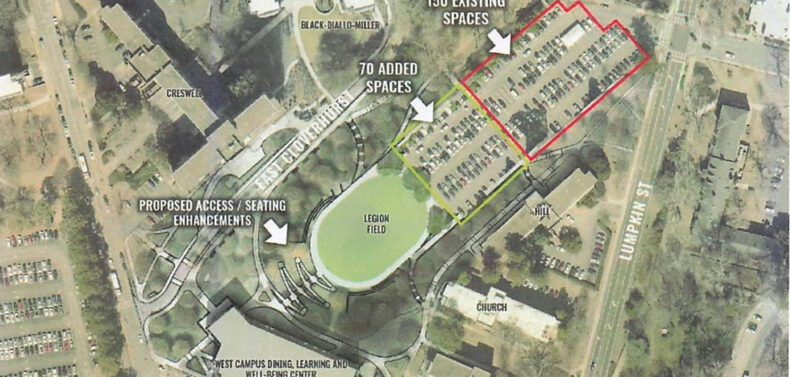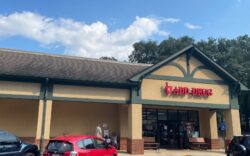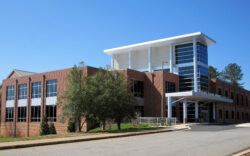Much to the dismay of many in the Athens community, University of Georgia officials plan to demolish Legion Pool, its pool house and the Legion Field bandstand to “better serve and support UGA students” and to create more parking.
“Legion Pool is an amazing community resource, and it breaks my heart to think it will go away,” says Athens resident and part-time faculty member Rebecca Burns. She and her husband were Sunday fixtures at the pool last summer, arriving when it opened and grabbing a shady spot near the picnic tables with their books and towels. “It was so relaxing and calm.”
So enamored with Legion Pool was Burns that she bought a T-shirt celebrating the pool’s longevity. It’s a relatively inexpensive university recreational resource that’s available to the public, but those are disappearing. Feild Track, used for decades by local residents, will soon be gone to make way for more UGA football facilities.

UGA Dean of Students Eric Atkinson chaired a working group—composed solely of UGA administrators and students—that decided to close the pool and redevelop the property. In a UGA Today story, he says fewer than 2.5% of UGA students use Legion Pool, which is open from late May to early August. The pool loses almost $90,000 annually, with the Student Activity Fee covering the deficit.
That students don’t use the pool is understandable, say many patrons. The pool opens usually after spring semester ends, when students are leaving, and is closed when fall semester begins—even though temperatures remain high well into late September and early October. And the university doesn’t actively market Legion Pool to students.
Burns says her daughter was a UGA student for eight years and never knew she could swim in Legion Pool, which was a few steps from her dormitory. UGA closed the pool in 2020 because of COVID-19 and kept it closed in 2021. When it reopened in 2022, many noticed that fewer people were coming.
Legion Pool was dreamed up by the Allan R. Fleming Post No. 20 of the American Legion in Athens. Members thought Athenians needed a community center with a pool, a playground and a cabin where the post could meet. In 1933, they found a “bowl” of land on Lumpkin and bought the property. By 1936, the pool was tiled, and the bathhouse and shelter were finished. The New Deal-era Works Progress Administration and the Public Works Administration allotted $18,000 to the project, with the City of Athens and local residents raising $12,500. Designed by architect C. Wilmer Heery, at the time it was the largest pool between Richmond, VA and Miami, FL. At the beginning of World War II, 600 U.S. Navy cadets a day were learning to swim in Legion Pool. The City of Athens operated the pool for white patrons until 1952, when it sold the pool and land to the Board of Regents for $75,000. The pool was to be held in trust for the Athens community. It was opened to Black residents in 1966.
In 2012, then-President Michael Adams offered a plan to destroy the pool and build a new one near Lake Herrick. People in the community proposed starting a nonprofit to cover some of the costs of operating the pool. University officials weren’t receptive to that idea.
“They don’t market the pool to students,” says Sara Baker, who has been swimming at Legion Pool most of her life. “They’ve been rigging the system for years, saying few students use Legion and keeping it open only a little while. They could open it earlier and keep it open later for the students to enjoy.”
Historic Athens placed Legion Pool on its “Places in Peril” list in 2021, citing deferred maintenance and limited hours. “Adaptive reuse could allow this nearly century old site to benefit UGA students and the city of Athens for generations to come,” the preservation group said in a Sept. 26 statement. “Historic Athens calls on UGA, as the state’s flagship institution, to lead by example and demonstrate that stewardship of cultural resources is compatible with campus growth.”
The UGA working group plans to enhance Legion Field “to create an expanded community green space and an outdoor amphitheater using the site’s natural topography,” according to UGA Today. It will also add 70 spaces to the parking lot.
Like what you just read? Support Flagpole by making a donation today. Every dollar you give helps fund our ongoing mission to provide Athens with quality, independent journalism.










